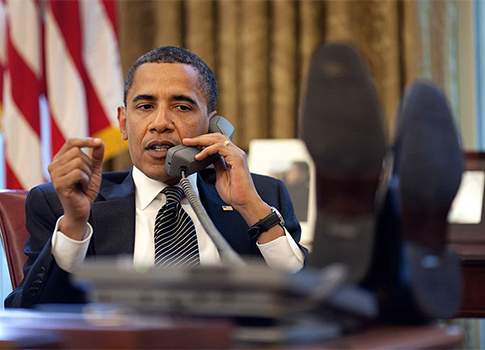In case you missed it, President Obama offered some candid insight into his "thoughtful" and "restrained" (his words) approach to foreign policy during an hour-long interview with Bloomberg’s Jeffrey Goldberg.
There’s also a lot of tedious exposition, so for those who’d rather not read the whole transcript, we’ve provided a few highlights here:
Obama gets tough… with Israel.
Israeli Prime Minister Benjamin Netanyahu visits the White House on Monday, where Obama is expected to threaten him with international isolation if Israel rejects a U.S.-drafted framework for peace with the Palestinians.
"If Palestinians come to believe that the possibility of a contiguous sovereign Palestinian state is no longer within reach, then our ability to manage the international fallout is going to be limited," Obama said. Israel might be "less safe" as a result. This is essentially the same warning he has given Russia regarding its actions in Ukraine. Obama then clarified by saying that America’s willingness to stand up for its ally wouldn’t "necessarily" change in such a scenario.
Obama thinks his enemies should take him seriously. His friends, too.
Goldberg asked why anyone – friend or foe – should think Obama’s threats of military force are credible after the "red line" incident regarding Syria. Have the Iranians, in particular, stopped taking that threat seriously?
"They should take my statements seriously," Obama said, adding, "The American people should as well, and the Israelis should as well, and the Saudis should as well."
Meanwhile…
Obama rewrites history on Syria.
For someone so clear-eyed as to the consequences of his Syria blunder, Obama seems to misremember how the almost-intervention played out. "Let’s be very clear about what happened," the president said. "I threatened kinetic strikes on Syria unless they got rid of their chemical weapons."
In this case, "threatened" seems a little bit overwrought when paired with such a meaningless phrase. "Kinetic strikes" sounds more like something Obama might have launched back in his community-organizing days. That’s beside the point, really, because we don’t recall Obama ever threatening to do anything to Syria "unless they got rid of its chemical weapons."
We do remember his "war-weary" speech backing military intervention for the sake of upholding "international norms" on chemical weapons use, only to disregard that argument after Russia stepped in to negotiate the disarmament plan that Syria continues to disregard.
Obama’s foreign policy mimics his failed approach to domestic policy.
When it comes to domestic policy, the president’s preferred strategy—mobilizing his 501(c)(4) group Organizing for Action, taking his case to the American people, "winning the argument"—has been a total failure. What does he have to show for it? Immigration reform? Gun control? He’s since given that up in favor of using executive authority to enact his agenda and declare the argument won. We know he has long pined for this sort of power.
Unfortunately, there’s no piece of paper Obama could sign to compel Russian forces to stand down in Crimea. So the president is forced to keep trying to "win the argument" on foreign policy, at home and abroad, by convincing people with his words. He grants hour-long interviews to docile journalists at critical junctures. He speaks in long, labored paragraphs in the traditional Obama style, as though the right turn of phrase might convince Putin to withdraw from Ukraine, Iran to give up the bomb, and Israel to do what he says.
He lectures his skeptics, including allies such as Israel and the Sunni Arab states, for clinging to the status quo. "Change" has come to the world, Obama says, and "change is always scary." One can imagine Obama coveting a sort of global OFA network at his disposal, with teams of volunteers roaming the halls of the Knesset, handing out flyers—"If not now, when?"—or accusing the Kremlin of "doing the Koch brothers’ bidding" by driving up oil prices.
He’s not big on extremism generally.
"I’m not big on extremism generally," Obama said.
